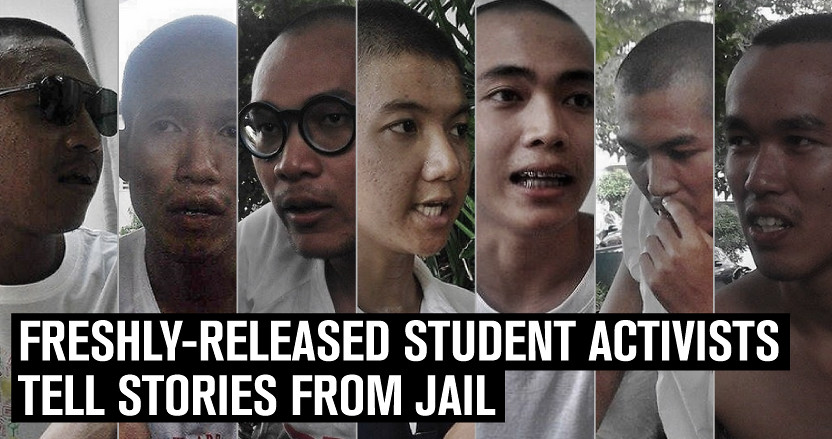Freed anti-junta activists from the Dao Din group talk to Prachatai about their experience in jail and how they learned about the value of freedom.
On Wednesday 8 July, the 14 anti-junta activists from the New Democracy Movement (NDM) were released after being detained for 12 days as a result of their peaceful anti-junta protests. The charges against them still stand.
Prachatai talked to seven student activists from Khon Kaen University about their life in prison and what they learned behind bars. They had all had their heads shaved in protest at being separated inside prison, but their determined gaze was still unwavering.
During our talk, the activists who were waiting to be interviewed wandered off to play soccer. It was probably their first match together after being released.
“Tong” - Wasan Satthasit
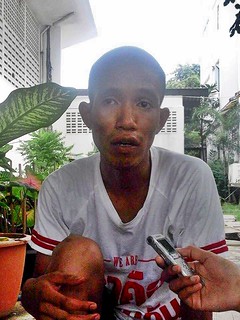
What was prison life like?
When we were all together in Zone 1, I wasn’t lonely at all. We would update each other on our relatives’ visits and analyze our situation together. The wardens took good care of us. There was always someone trailing or guarding us when we went to the bathroom, to smoke, to eat, or to shower. It was like they didn’t want other prisoners to interact with us.
At that time, we weren’t bored, even though there were no books to read. After we were separated into different zones, we weren’t completely lonely since there were still visiting hours for our relatives and lawyers. After we were moved, they continued to take good care of us, in a way that I would even say was careful. It was like we were special prisoners. I would say that our status as university students also helped to protect us. Our youth too, even if I don’t look it.
After we were separated into different zones I had to get to know whoever got to go with me. I was with Dave. I didn’t know him before this, so we got to know each other’s behaviour and personality.
A part of me secretly wanted us to stay longer, since I was adjusting to the situation inside the jail, including the food and living conditions. I also prepared myself to stay there for at least 48 days. But of course, I’m really happy to be out of there too.
The second you stepped out of jail, how did you feel?
I might be exaggerating, but I felt like I could smell freedom. Outside, I’m able to do whatever I want but inside I have to follow prison rules. The rules really regulated my body, and what I could do. I tried to think of the 12 days as a camp, monk ordination, or conscription. I didn’t want to stress myself out. While we were all together in Zone 1 there were a lot of ways to relax. We would tell jokes and funny stories from our own lives, and whoever told a lame joke would have to knock on the floor three times.
Did you meet any political prisoners in jail?
A lot, actually. Most of them are inclined toward the red side. They’d come up and greet me. They follow current events, since usually there are newspapers available in the prison. But when I went into the prison, they took away the newspapers, and the TV channels were changed from news to soap operas. They tried to do all this because they didn’t want us to talk to the political prisoners very much. They were probably afraid we were gonna cause some kind of protest in there.
For example, we all agreed to shave our heads if they separated us. When we did, other inmates who agreed with us, mostly political prisoners, shaved their heads to show support as well. The warden got in hot water with his supervisor since it was against prison protocol. But we weren’t trying to protest against the prison, we just wanted to communicate with the outside.
What do you think about the incarcerated political prisoners?
I believe no one should be jailed for expressing their opinions. There’s this inmate who’s been in there for 11 months although he has not been charged yet. The police just keep holding him. Each time he goes out to court, the case hasn’t been filed. They always say they haven’t finished drafting the case file. It’s been almost a year already.
He’s been there for almost a year although he’s done no wrong. It’s way too unjust towards him.
Regarding the behaviour of the wardens towards inmates, even if the inmates are wrong, even if they’re a danger to society, they’re still people. They shouldn’t be screamed at, beat up, or verbally abused.
This extends to the medical staff as well. No matter what inmates are suffering, they all receive the same set of pills: antibiotics, cold medicine, and paracetamol. The nurses act just like the wardens, often oppressively towards the inmates. I understand that they have to be tough to keep inmates in line, but sometimes they go too far, treating them as if they aren’t human.
Before you got arrested, you said you’d hold up one of your cloth protest signs in prison if anyone asks what you did to get jailed. When you got arrested for real, did anyone ask you about the charges against you?
The other inmates knew it was a political case, so they asked me if I had held protests. I had imagined before going in that it was probably going to be a funny situation, but when I went in for real it really wasn’t. It wasn’t funny at all.
The wardens also tried to make it hard for us to interact with other prisoners, so I didn’t get to talk to them or exchange views with them very much. From what I could tell, though, the inmates who took care of us wanted us to get out on bail because to them we didn’t seem like thieves or dangerous people.
Anything to say to the public?
In the future don’t be sorry if you didn’t rise up to fight with us today. We don’t know how long we can survive in this sort of atmosphere, so you have to do something, no matter who.
“Base” - Suvicha Tipangkorn
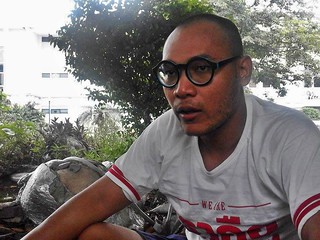
How did you fare in prison?
When we were all together in Zone 1 we got to know each other better. Some of us hadn’t met before and only got to know each other in prison. It was fun and rowdy, and we adjusted ourselves to the prison bathrooms. When I was moved to Zone 3 I was so sad, I cried. They separated me from my friends so unexpectedly.
I had to readjust myself in Zone 3, and learn new things. They took good care of me and let me stay towards the front of the Zone. I went into the bedroom at 3 pm each day to sleep, meditate, watch TV, and watch the news. There was at least some news to watch. I had to wake at 6 am each day to shower and use the bathroom before coming back to the cell, hoping that my relatives would come visit me that da. After a 20-minute visit, I would eat, shower, and enter the cell again. This cycle would just keep repeating. The bedroom was clean, and I slept with 11 other people, all elderly men. We were so crowded our feet touched when we slept. They let me sleep there because there was a camera in that room.
Did you get to talk much with the other prisoners?
I got to know guy who got hit with the Criminal Court bombing case. He’s also an Isaan person, like me. We talked about how only Isaan people were getting arrested, and we spoke in Isaan too.
I want to say that it’s not scary in prison like you think. If you know how to survive and don’t pick fights with others, then it isn’t that bad. Even after being there for just a few days I exchanged addresses with some other inmates. I told him that he could come hang out at Dao Din meeting house (บ้านดาวดิน) since he was getting out next year. He said he didn’t have any relatives since his father and younger sibling was dead, and his mom had a new husband. He didn’t have a place to live either, so I said he could come to us.
Do you have anything to say to the public?
I have something to say to people with strong prejudices against prison inmates. They might be heavily tattooed but that doesn’t mean they’re just gonna harm people easily. They have their own reasons for getting in prison. In prison, everyone’s equal: it doesn’t matter what age you are, you can all be friends. There is no ranking or hierarchy in there. It doesn’t matter if you were some big hot-shot godfather on the outside, but inside, everyone’s just another inmate using the same bathrooms and eating the same food.
Payu Boonsopon
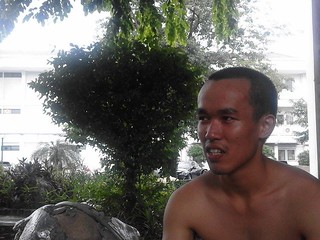
What was prison like for you?
Before going in I thought it was gonna be a horrible place full of gangs and hazing. When I arrived there around 2 am the atmosphere was much different than what I initially thought. We slept, then when we woke up there were these wardens guarding us. The supervisor told them to take special care of us and barred us from talking to the other prisoners.
After we were separated into different Zones we agreed that we had to try and meet each other more, so we told our relatives to visit us during the same 9 am visiting rounds. That way, we would get to meet and discuss. The difference between Zone 1 and 2 is, Zone 1 mixes both inmates waiting for a verdict in their cases as well as those who have already been sentenced, so there are inmates of all ages in there. In Zone 2, there are only young people from 19 years old to no older than 25. So since young men aren’t as responsible in some areas, Zone 2 is really dirty. (laughs)
Before going into Zone 2, a Zone 1 senior inmate told me to watch out or tum moy. What is tum moy?, I thought. I knew soon after going into Zone 2. It’s similar to chickenpox or German measles, and it’s really scary. People infected with it are in trouble. Their limbs are swollen and their blisters ooze pus.
People in Zone 2 are divided into cliques quite systematically. Gangsters and bullies bring their group members to fights, and the Zone is divided into gang territory. Friends will stick to their groups. The Zone is also divided by sexual orientation. Ladyboys run the Yaowarat [Chinatown] zone.
How did you feel when you got out of prison and saw your friends?
I felt like I got to see them a lot in prison, but this time it was different because we were free. We could walk anywhere we wanted without high walls fencing us in, and I could feel that we were free. When meeting other groups of friends I was also happy, since I got to talk to them and hold their hands.
I felt like we were being watched extra closely in the prison. I don’t know if I’m imagining it, but I think the wardens of each Zone forbad the other inmates from talking to us. Once another inmate was curious so he came up and was like, ‘Hey kid, what’re you in here for?’ so the warden came up to us, asked us what we were talking about, and ordered the other inmate to do squats. After that no one really talked to me, except in the bedroom cell.
Anything else?
I’m glad I’m out of prison because there’s no freedom. Each day I have to come and sit in front of the Zone for the wardens to guard me all day. I’m glad I got to come out and talk about what’s really bad about prison and the living conditions, so that people interested in this can know about it. I hope people will understand that prisoners aren’t as bad as they think. Some of them forged really strong bonds with us. They’re just like other people in society. I don’t think all of them did evil things to end up in prison, more like society pressured them to do those things. After they get out, a lot of times society won’t accept them. If anyone’s interested I would be glad to talk more about this. I’m thankful that I got to come out of prison with knowledge to spread.
“Nice” - Panupong Srithananuwat
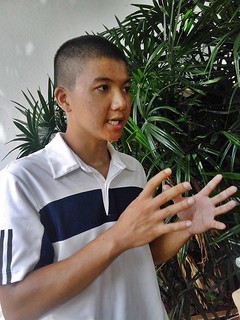
What were your living conditions in prison like?
At first I felt really anxious since I had assumed that it would be scary, like the media had told me. When entered the reception zone, everything was done so rigorously, done according to prison protocol. The warden was in charge of keeping order in the Zones. There was a cell leader who took care of the rules in the cell. At first when we were all together in Zone 1 there wasn’t much to do since there were no books to read, so we just sat around. After we were separated into different Zones, the wardens kept an eye on our safety. In the prison’s eyes, we were not criminals who robbed or killed, but we were prisoners of conscience.
When we were all together in Zone 1, it wasn’t all happy-go-lucky but at least we weren’t lonely. We were totally unprepared for the separation, so I admit to feeling lonely after that.
Life in Zone 2 wasn’t so different, and there were books to read too. Zone 2 is divided into territorial areas, called baan (houses). For example, inmates who come from around the Ramkhamhaeng area will be in Baan Ram. Other baan include Baan Malaysia, Baan Singapore, Baan Islam, Baan Lad Phrao. There’s an entire system of governance, and jobs assigned to the members of each baan. The leader of each baan, por [father] baan, takes care of the members. The members’ jobs include finding goods, saving seats, reserving the laundry area, and hanging up the laundry. They have a system in place and members each have their jobs.
Did you meet any other political prisoners?
Quite a few, actually, 4-5 people. We talked about current events. They asked me why I came out to protest against the NCPO. I explained the same way I had explained to the media. We used to work in Khon Kaen, working with farmers and miners on the issue of resources, and how state projects infringe on them. Protesting against the junta is the same issue.
We also exchanged whatever we knew. They also have their own set of knowledge. For example, I’d talk about upcountry resources and how the state was imposing on them, while they’d tell me about the political system.
I think of my incarceration as a life experience. Some people haven’t even been proven guilty yet and they’re being held in detention there for 7 months. I don’t understand how the justice system can let this happen. They need to finish the case already so at least the inmates know what’s going to happen, and can set about planning for their lives. If you don’t convict them and leave them in limbo, you shouldn’t have the right to imprison them for long periods of time like this.
I don’t want society outside to immediately brand inmates as scary jailbirds. If you open your heart a little and just talk to them, they’ll do the same to you. They have their own reasons for getting in there, such as coming from an impoverished home and getting no education. Without even a chance at education, their options of finding a living are very few. So to support their wives and kids they might turn to selling drugs.
I hope society can see them as people too. They’re much better than us in terms of having mastered the art of survival. They’re much scrappier and have struggled more. We have money and education, and our parents paid for our tuition. The inmates have nothing, so there is no choice but to struggle.
Asaree Thaitrakulpanich, Yiamyut Sutthichaya, and Narisara Suepaisal contributed to this report.
